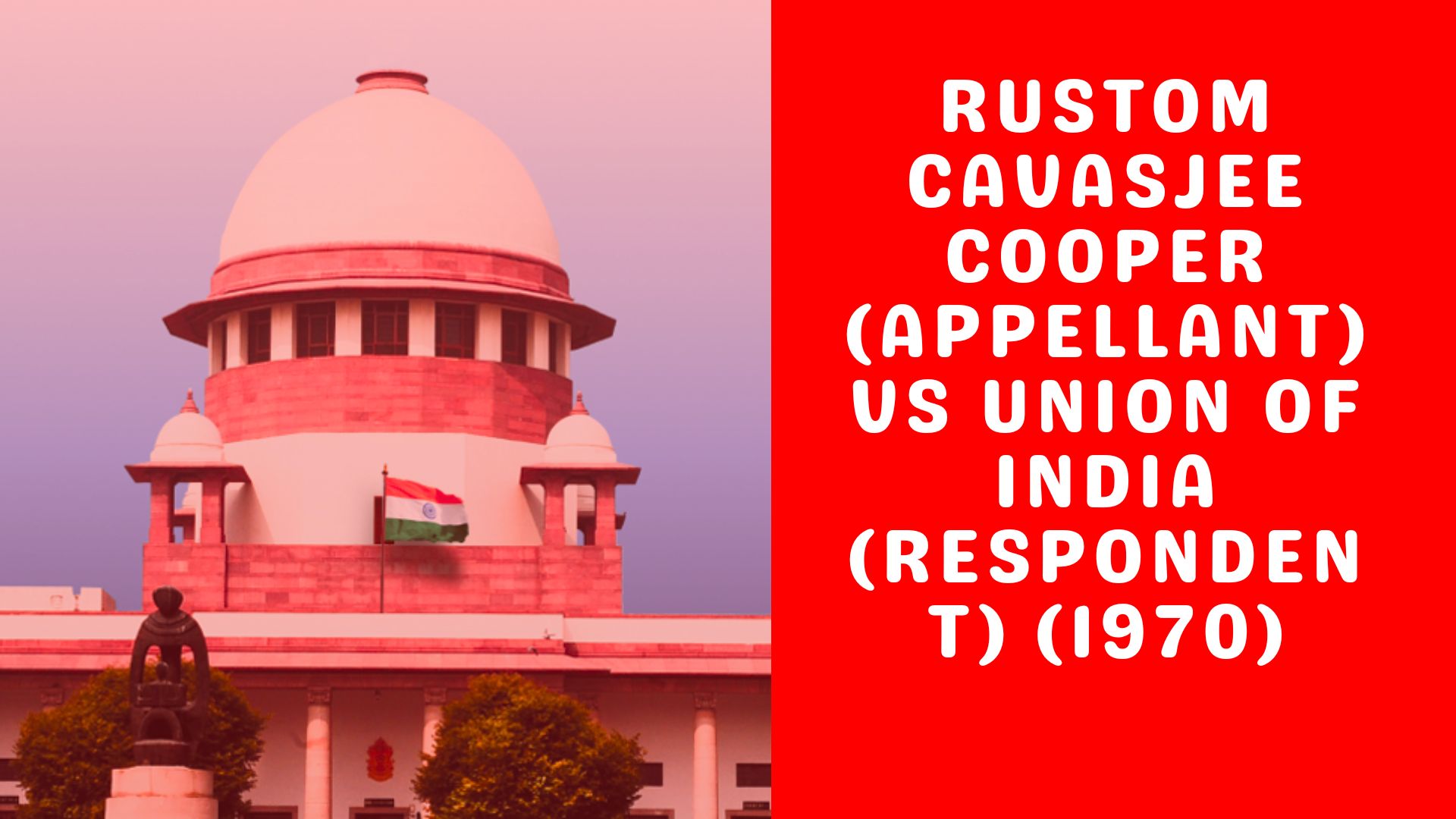
(1970) 02 SC CK 0010
In The Supreme Court of India
Case No: Writ Petition Nos. 222, 298 and 300 of 1969
Date of Decision: 10-02-1970
Bench: Full Bench
Hon'ble Judges: Vishishtha Bhargava, J; S. M. Sikri, J; P. Jaganmohan Reddy, J; K. S. Hegde, J; J. M. Shelat, J; J. C. Shah, J; I. D. Dua, J; G. K. Mitter, J; C. A. Vaidyialingam, J; A. N. Ray, J; A. N. Grover, J
Advocates: N. A. Palkhivala, M. C. Chagla, A. J. Raja, N. N. Palkhivala, R. N. Bannerjee; Niren De (Attorney General), Jagadish Swarup (Solicitor General), M. C. Setalvad, C. K. Daphtary, R. H. Dhebar
Final Decision: Disposed Of
[Judgment Source]
https://www.courtkutchehry.com/Judgement/Search/AdvancedV2?docid=282049
All Citations
AIR 1970 SC 564; (1970) 1 SCC 248; (1970) 3 SCR 530; (1970) 40 CompCas 325
Name of the Court
Supreme Court of India
Facts of the Case
The petitioner, a shareholder, director and account holder in several large commercial banks, challenged the nationalisation of 14 banks effected first by Ordinance 8 of 1969 and then by the Banking Companies (Acquisition and Transfer of Undertakings) Act, 22 of 1969. The enactment vested the entire undertakings of the named banks in new government-owned ‘corresponding’ banks, displaced management, transferred employees, and provided compensation on principles set out in the Second Schedule. He alleged violations of Articles 14, 19(1)(f) & (g) and 31(2), and questioned the President’s Ordinance power.
Law Points Raised
1) Maintainability/locus: whether a shareholder/director/depositor can challenge acquisition affecting the company’s undertaking.
2) Scope of Article 123 (Ordinance-making) and retrospective validation by Parliament.
3) Legislative competence: whether Parliament encroached on State List subjects.
4) Article 14: arbitrariness/unreasonable classification in compensation principles and scheme.
5) Articles 19(1)(f) & (g): direct effect on individual rights to property and to carry on trade/business.
6) Article 31(2): whether the Act provided ‘compensation’ or illusory amounts by prescribing depressed valuation (e.g., ‘ascertained value’ for buildings).
Acts / Provisions / Articles Referred
• Banking Companies (Acquisition and Transfer of Undertakings) Act, 1969/1970 — esp. Sections 4, 5, 15(2); Second Schedule (valuation principles).
• Banking Regulation Act, 1949 — Sections 5, 6(1), 22, 27.
• Constitution of India — Articles 14, 19(1)(f) & (g), 31(2) (as then in force), 301; Article 123 (Ordinances).
Judgements Referred
Earlier precedents on: (i) shareholder standing; (ii) relationship between Articles 19 and 31; (iii) tests of ‘compensation’ and reasonableness; and (iv) the ‘object vs. effect’ approach (Gopalan line).
Obiter Dicta
Fundamental rights analysis focuses on the direct effect of State action on individual rights; the ‘object’ of the law is not decisive. Shareholders are not debarred merely because the company owns the undertaking.
Ratio Decidendi
• The Act’s compensation scheme was unconstitutional: valuation rules (e.g., ‘ascertained value’ cap for buildings) made compensation illusory, infringing Article 31(2).
• The scheme also offended Article 14 due to arbitrary/unreasonable classification and unguided discretion.
• Fundamental rights are to be tested by the law’s impact on individuals (effect), not merely by its object; a shareholder can maintain a petition when personal rights are directly affected.
Final Ruling
Petitions were allowed in substantial part: key provisions of the 1969 nationalisation law were struck down for violating Articles 31(2) and 14. (Parliament subsequently re-enacted the measure with revised provisions in 1970.)
Summary
A landmark ruling on bank nationalisation and the architecture of fundamental rights, the Court held that the 1969 acquisition law failed Article 31(2) (illusory compensation) and Article 14, and affirmed that rights are examined by their effect on individuals, enabling shareholders to challenge State action. The judgment reset the approach to Articles 14/19/31 and led to a revised nationalisation statute in 1970.
[Judgment Source]
https://www.courtkutchehry.com/Judgement/Search/AdvancedV2?docid=282049